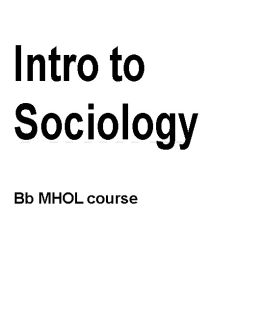LSC Introduction to Sociology (Online Course Blackboard)
1st Edition
0073337773
·
9780073337777
© 2007 | Published: October 26, 2006
This course provides a broad overview of sociology and how it applies to everyday life. Major theoretical perspectives and concepts are presented, including sociological imagination, culture, deviance, inequality, social change, and social structure.…
Read More
Request Review Access
Receive via shipping:
- Print bound version of the complete text
Topic 1 The Sociological Perspective
What is Sociology?
Theoretical Frameworks of Sociology
The Sociological Imagination
Topic 2 Development of Sociology
Sociological Timeline
Topic 3 The Research Process
The Scientific Method
The Scientific Method: Step 1
The Scientific Method: Step 2
The Scientific Method: Step 3
The Scientific Method: Step 4
The Scientific Method: Step 5
The Scientific Method: Step 6
The Scientific Method: Step 7
Applying a Code of Ethics
Topic 4 Culture and Society
Defining Culture
Cultural Values
Culture in Flux
Cultural Encounters
Three Major Theories
Topic 5 Socialization
What is Socialization?
Agents of Socialization
Sociological Theory
Topic 6 Social Structure
Social Structure
Social Roles
Groups in Societies
Parts of Complex Societies
Topic 7 Social Institutions: The Family
Defining Family
Family Structure
Challenges to Families
Topic 8 Deviance
Facets of Deviance
Deviance and Sociological Theory
Deviance and Crime
Topic 9 Social Stratification
Defining Social Stratification
Stratification Theory
Aspects of Social Stratification
Topic 10 Social Inequality
Defining Social Inequality
Terms Associated with Inequality
Responses to Inequality
Social Inequality Theory
Topic 11 Social Change
Collective Behavior
Social Movements
Theories of Social Change
Topic 12 Social Institutions: Religion, Education, and Health Care
Defining Social Institutions
Religion
Education
Health Care
Topic 13 Social Institutions: Government, Economy, and the Environment
Social Institutions: Economic Systems
Social Institutions: Political Systems
Social Institutions: The Environment
This course provides a broad overview of sociology and how it applies to everyday life. Major theoretical perspectives and concepts are presented, including sociological imagination, culture, deviance, inequality, social change, and social structure. Students also explore the influence of social class and social institutions such as religion, education, healthcare, government, economy, and environment. The family as a social structure is also examined.
After completing this course, students will be able to:- View people’s behavior from a sociological perspective, discover your own sociological imagination, and apply it to a variety of social problems and situations.
- Discuss the development of sociology as a science and differentiate it from the other social sciences.
- List at least five sociologists and their major contributions to the field.
- Describe the three major sociological perspectives—Functionalist, Conflict, and Interactionist—and analyze human behavior applying these perspectives appropriately.
- Explain the elements of a culture and how culture is different from society.
- Explain the seven steps of the scientific research process and recognize appropriate research procedures in an experiment or an article describing research.
- Explain the relationships between social structure, social stratification, and the consequences of social status.
- List at least four universal social institutions and describe the characteristics of each.
- Describe how inequality and other social factors contribute to social change.
- Summarize the relationship between socialization and the family.
After completing this course, students will be able to:- View people’s behavior from a sociological perspective, discover your own sociological imagination, and apply it to a variety of social problems and situations.
- Discuss the development of sociology as a science and differentiate it from the other social sciences.
- List at least five sociologists and their major contributions to the field.
- Describe the three major sociological perspectives—Functionalist, Conflict, and Interactionist—and analyze human behavior applying these perspectives appropriately.
- Explain the elements of a culture and how culture is different from society.
- Explain the seven steps of the scientific research process and recognize appropriate research procedures in an experiment or an article describing research.
- Explain the relationships between social structure, social stratification, and the consequences of social status.
- List at least four universal social institutions and describe the characteristics of each.
- Describe how inequality and other social factors contribute to social change.
- Summarize the relationship between socialization and the family.

